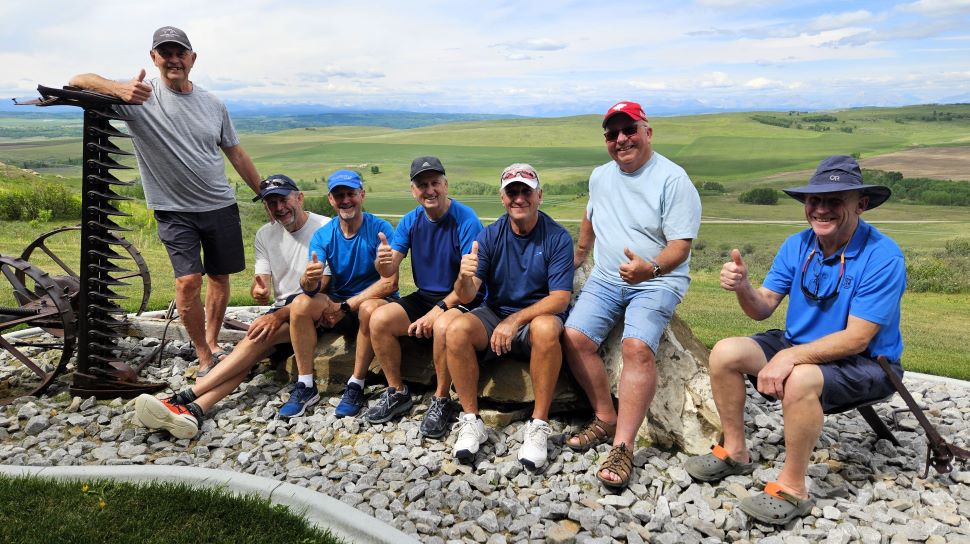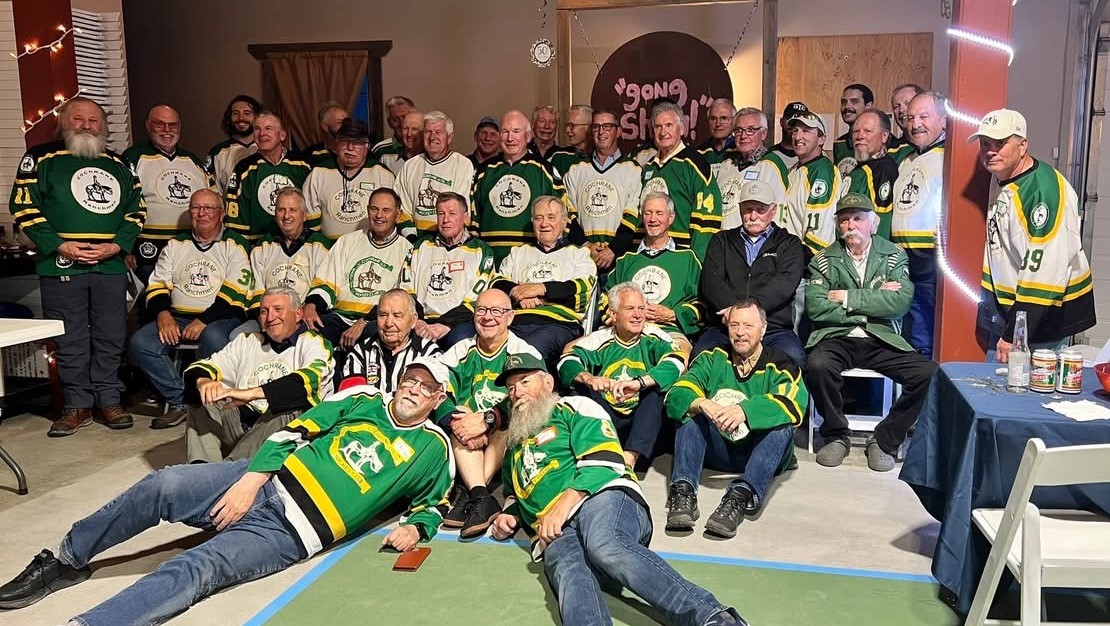“Once a Ranchman, always a Ranchman!”
You hear similar chants in other sports circles, but for the Cochrane Ranchmen, it’s a phrase that has endured the test of time.
Fifty years, to be exact—placing it among the longest continuously running hockey clubs in Alberta.
The Ranchmen marked their 50th anniversary on June 14 with a reunion where tales were shared and old friendships rekindled. Over 50 hockey players attended—about 90 people altogether. For many, the team has grown into something far greater than just a hockey club—it’s become a lifelong brotherhood.
Over the years, more than 100 players have been Ranchmen, and at the celebration, special attention was paid to the original players able to attend, along with a moment of quiet reflection for those who had passed.
"We celebrated this accomplishment because there aren't many teams that can say they have been going for 50 years," said Charlie Crutchfield. "We've had a 25th anniversary party, we had a 40th celebration, and now a 50th. There are guys from the start coming from the mid-1970s to the present players."
He said the oldest Ranchman attending was 91 years old and played with the team for 25 years.
Crutchfield joined the team in 1987 to play defence following a tryout and a team vote—still a tradition among the Ranchmen. He took the place of his brother-in-law when he retired and played with all but a few of the first Ranchmen over the years.

We were in a barn for the interview, but it sure felt like a dressing room, slangs and all. The first shots were taken at Crutchfield.
"I'm just wondering, was he a lousy defenceman, too?" chirped in one of the gang, followed by an outburst of laughter.
"Hey, I was the only defenceman here who ever came back to the net," quips Crutchfield. "There were defencemen I had to use hand signals to communicate with because they never came back over the centre line."
"We never backchecked either," fires back another player, to another round of laughter.
Roger Mitchell was a centre with the team for 15 years and the only one who confessed he came back to help.
"Because of my size, I was helping out the defenceman when they needed help with some physical stuff."
He's glad he passed the audition to join.
"Once they found that you were a good fit for the team, you were asked to stay. It's such a great group of people, on and off the ice."
Ron Jacobsen found his way to the Ranchmen when he met Mark Berman on the golf course shortly after arriving in town in the '90s.
"I think their goalie packed it in, so they needed a new goalie, but I had to try out. I tried out for a couple of teams, and luckily, I made it with the Ranchmen."
In his first game, he was given a warm welcome by one of the players with a shot in warm-ups.
"He tried to take my head off, and it caught me right beneath the mask. Oh yeah, welcome to the Ranchmen."
But he wasn't discouraged one bit.
"I played for 20 years on and off. We went to a tournament and I broke my leg. I have three screws in my left knee because of that. That was followed by rotator cuff surgery, and a hip replacement, but you'd suck it up and you'd keep on playing."
“He had a lot of severe burning on the back of his neck, too,” chipped in Kelly Kimmett. “We went through a lot of sunscreen.”
Kimmett is a newbie in comparison to some of the others gathered, joining the Ranchmen in 2008 after two decades of facing off against them as a member of the Flying Pylons.
After the tragic loss of his daughter Lindsay in a car accident, he was invited to come play with his buddies, even though he was grilled by the boys as possibly being a better fan than a player.
“We actually performed a trade,” they joked. “How many pucks did we have to give? I can’t recall, but we’re still paying off his signing bonus.”
“They think they liked playing against me more than playing with me,” Kimmett responded.
Mark Berman was a right winger for 25 years, and proudly called himself “the best in our league”—a claim that draws some eye rolls and good-natured jeers from teammates.
While no longer lacing up, he remains a Ranchman through and through.
“You're on this team for life,” he says. “It’s like a band of brothers. We play golf together, we hang out, we do everything together.”
Even the team’s Christmas parties become legendary—part gift exchange, part roast.
“There was far more effort put into those gifts than your wife’s gift,” chips in Kimmett. “That kind of became contentious.”
Two high drafts from 1988 were forward Rob Owens and defenceman Denis Marcial.
“Actually, I had to give my hat,” laughed Marcial. “There was a guy on our team named Stan who eyed up my hat.”
“Well, I’m a hat collector and I’m trying to get to 500. I have 499, and you’re on the team, but I’m taking your hat,” Stan told him. "So he did."
Crutchfield, his defensive partner for several seasons, says Marcial's nickname was suiting.
"We called him "Crash" because he always seemed to run into somebody, and then he had a few choice words with the ref... but that's about all I can say."
Both Owens and Marcial agreed that hockey was fun, and they miss it—but what mattered more were the bonds they formed.
“I think the biggest thing was the dressing room, the camaraderie—you know, the constant harassment in a good-spirited way,” said Marcial. “Consequently, you become forever friends because of that. I played for 25 years, and that’s probably the thing I miss the most.”
“Everybody has pressures in their life, but when you walked into that dressing room, there was no pressure," said Owens. "Whether you’re a baker or a plumber or a salesman, you were just a guy playing hockey.”
"I think we’re very fortunate," said Marcial. "It’s something a lot of guys don’t get to enjoy in their adult years or parenting years, and we had it."
No one mentioned whether they won any of the tournaments they entered. They may have, but there were more important things to chat about.
“It wasn’t about how many games we won; it was all about getting away with the gang,” said Marcial. "We had our own traditions, and it was a lot of fun.”
Today, several of the former Ranchmen continue to gather with teammates and their wives. Some head out for sociable games of golf or pickleball on Fridays, taking turns bringing lunch and keeping the spirit of the dressing room alive.
![]()
So how did the club get its name? They look at each other, then back at me.
"That's a good question," said Crutchfield. "We've been talking about that."
The logo came about when the team decided to get some new jerseys early on and sought a name to properly reflect the iconic Men of Vision insignia they wore. "The Ranchmen" was the right fit.
At its peak, the Ranchmen played a 60-game schedule, including tournaments. Today, suitable ice time is harder to come by, and their calendar has slimmed down to about 24 games a season.
After 50 years, the Ranchmen show no signs of fading. They're working out their schedule for the season ahead, and before you know it, they will be returning for their 51st season.
At the end of the interview, they left me with the parting song that is attached. Thanks for the memories, guys.
